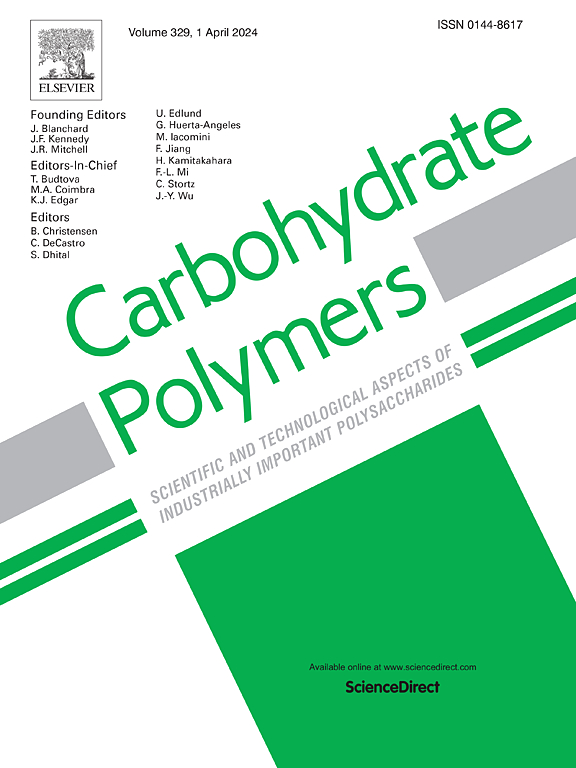调控巨噬细胞极化的仿生岩藻聚糖纳米颗粒靶向治疗急性肺损伤。
IF 10.7
1区 化学
Q1 CHEMISTRY, APPLIED
引用次数: 0
摘要
急性肺损伤(ALI)是一种复杂的急性呼吸道疾病,死亡率高。活性氧(ROS)在ALI中起关键作用,诱导细胞损伤、炎症和氧化应激,从而加重损伤的严重程度。在这项研究中,受“减法”策略的启发,我们开发了一种基于岩藻糖烷的巨噬细胞膜生物纳米系统,缩写为MF@CB,被设计为抗炎和抗氧化剂,以减轻ALI中脂多糖(LPS)诱导的炎症。MF@CB包裹巨噬细胞膜,有效靶向和积聚在ALI病变。此外,MF@CB激活巨噬细胞中Nrf2的转录活性,抑制其起源处的ROS合成,同时有效去除ALI中已经存在的ROS。这种双管齐下的方法显示了强大的抗氧化特性,并恢复了巨噬细胞的抗氧化防御屏障。在lps诱导的ALI小鼠模型中,MF@CB通过调节肺巨噬细胞极化,抑制活化免疫细胞过度分泌促炎细胞因子,显著减轻肺炎症损伤。更重要的是,与大多数去除分子的表面修饰策略不同,这种方法更容易应用,潜在更安全,并可能为开发更有效的ALI治疗策略提供有用的见解。本文章由计算机程序翻译,如有差异,请以英文原文为准。

Biomimetic fucoidan nanoparticles with regulation of macrophage polarization for targeted therapy of acute lung injury
Acute lung injury (ALI) is a complex acute respiratory illness with a high mortality rate. Reactive oxygen species (ROS) play a pivotal role in ALI, inducing cellular damage, inflammation, and oxidative stress, thereby exacerbating the severity of the injury. In this study, inspired by the “subtractive” strategy, we developed a fucoidan-based macrophage membrane bio-nanosystem, abbreviated as MF@CB, designed as an anti-inflammatory and antioxidant agent to alleviate lipopolysaccharide (LPS)-induced inflammation in ALI. MF@CB coated with macrophage membrane for effective targeting and accumulation in ALI lesions. In addition, MF@CB activates Nrf2 transcriptional activity in macrophages, inhibiting ROS synthesis at its origin while effectively removing ROS already present in the ALI. This dual-pronged approach demonstrates robust antioxidant properties and restores the macrophage antioxidant defense barrier. In the LPS-induced ALI mouse model, MF@CB significantly mitigated lung inflammatory damage by modulating lung macrophage polarization and inhibiting the over-secretion of pro-inflammatory cytokines by activated immune cells. More importantly, unlike most surface modification strategies because it remove the molecule, this approach is easier to apply and potentially safer and may provide useful insights into the development of more effective therapeutic strategies for ALI.
求助全文
通过发布文献求助,成功后即可免费获取论文全文。
去求助
来源期刊

Carbohydrate Polymers
化学-高分子科学
CiteScore
22.40
自引率
8.00%
发文量
1286
审稿时长
47 days
期刊介绍:
Carbohydrate Polymers stands as a prominent journal in the glycoscience field, dedicated to exploring and harnessing the potential of polysaccharides with applications spanning bioenergy, bioplastics, biomaterials, biorefining, chemistry, drug delivery, food, health, nanotechnology, packaging, paper, pharmaceuticals, medicine, oil recovery, textiles, tissue engineering, wood, and various aspects of glycoscience.
The journal emphasizes the central role of well-characterized carbohydrate polymers, highlighting their significance as the primary focus rather than a peripheral topic. Each paper must prominently feature at least one named carbohydrate polymer, evident in both citation and title, with a commitment to innovative research that advances scientific knowledge.
 求助内容:
求助内容: 应助结果提醒方式:
应助结果提醒方式:


